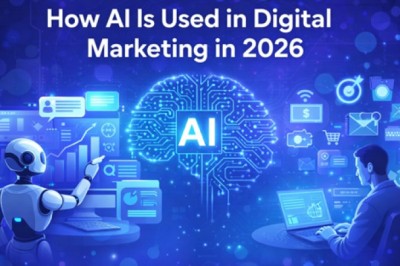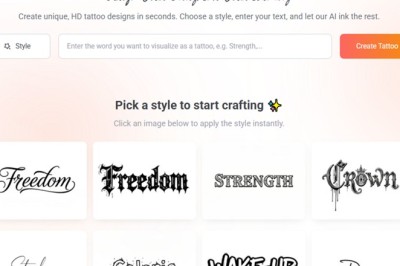views
What is social monitoring?
Social media monitoring means watching what folks say online to figure out what's happening. It's more than just counting likes; it's understanding what people think and care about. Many business groups use it to make better choices, personalize their interactions, and stay ahead. Platforms like Pinterest, TikTok, X, Instagram, and Facebook have tons of info. If you pay attention, you can spot trends, learn what annoys your customers, and keep them happy.
Why social monitoring matters
For digital marketers
To run successful campaigns, marketers need to understand their audience. Watching social media helps them learn what people like, dislike, and what's trending. When marketers listen to these online talks, they can tweak campaigns to better meet audience needs. This usually means more attention, more customers, and better results.
Let’s say a tech company's marketer is following chatter about new tech. If AI takes off, they can focus their materials on their AI products, showing they're experts.
For sales teams
Social monitoring is a game-changer for sales teams. It helps them spot leads and really get what their prospects are about. By keeping tabs on mentions, comments, and convos, sales folks can pinpoint exactly what potential clients are looking for and make their approach super personal.
Like, if a SaaS sales rep sees a prospect complaining about data management headaches, the rep can then offer a fix that tackles those specific problems head-on. These kinds of personal pitches tend to win more deals and build trust way quicker.
For Account-Based Marketing (ABM) teams
ABM is all about high-value accounts, so personalization is everything. Social monitoring helps ABM teams gather intel on target accounts—like decision-makers’ interests, company changes, or new projects. Using social listening tools makes tracking these insights much easier and more accurate.
Like, if a major store wants to sell more online, an ABM group can make ads showing how their stuff helps them do just that. This makes the ads feel spot-on and useful, which gets people interested and makes them more likely to buy.
For business development professionals
Business development means finding chances and hooking up with partners. Watching social media helps folks keep up with what's new in the market, who the rivals are, and who might make a good partner.
Think of a logistics company's business development person. They could watch what e-commerce companies say about having delivery problems. Knowing this, that person can offer solutions made just for them and make their company look like the best partner around.
Why social media monitoring is important
Social monitoring offers a ton of benefits for businesses, big and small:
- Understand your audience: Dive deep into what your audience likes, cares about, and struggles with. This info lets you make content and campaigns that actually connect.
- Crisis management: Social media gives customers a loud, public platform to complain. Monitoring helps you spot problems early and respond fast before things blow up.
- Competitor analysis: Keep an eye on what competitors are doing, learn from their wins and mistakes, and find ways to stand out.
- Brand reputation management: Negative sentiment can spread like wildfire. Monitoring lets you fix issues before they get out of hand.
- Identify influencers: Spot opinion leaders in your niche to partner with and boost your reach and credibility.
Tips for creating an effective social media monitoring strategy
- Establish clear policies and guidelines
Make the rules clear to everyone. Explain what workers can share, where to share it, and what the results are if they don't follow rules.
In fields like healthcare or teaching, following the rules is super important. Laws like HIPAA for healthcare and FERPA for schools demand strong data safety practices. Staff should only use safe, approved systems – don't put private stuff on social media. For instance, healthcare workers should use messaging apps that follow HIPAA and never share patient info publicly.
- Define goals and objectives.
Before you begin keeping tabs, figure out what you want to learn. Are you tracking whether customers are happy? How do people view your brand? Or what your rivals are doing? What numbers are most important, like mentions of your brand, how people feel about it, how they interact with it, or what influencers are up to? Having clear aims helps you plan and keeps you on track with your overall company aims. - Identify key platforms and channels.
Not every social platform matters. Figure out where your audience, competitors, and influencers hang out.
- Primary: Facebook, Instagram, X (Twitter), LinkedIn, YouTube
- Secondary: TikTok, Pinterest, Reddit (depends on your industry)
- Niche: Industry-specific forums can sometimes give more useful insights
Prioritize based on where the action really is.
- Determine Key Performance Indicators (KPIs)
KPIs show if you’re succeeding. Some common ones:
- Brand mentions & reach: How often is your brand talked about, and how far do those mentions go?
- Sentiment analysis: Are people talking good, bad, or neutral about you?
- Engagement metrics: Likes, shares, comments, interactions
- Share of voice (SOV): How visible are you compared to competitors?
- Customer service metrics: Track complaints and resolution times to gauge satisfaction
- Implement social media archiving.
Everything posted on official channels is technically public record. Proper archiving ensures transparency, compliance, and data integrity.
Data loss, whether accidental or on purpose, can cause legal headaches. To avoid that:
- Use legal holds during incidents or potential lawsuits
- Regularly audit archived content.
- Preserve edits, versions, and metadata.
- Capture deletions in near real-time.
These practices are crucial in compliance-heavy industries like finance, healthcare, or education, where rules like HIPAA, FERPA, FINRA, GDPR, or FOIA apply.
If you want to learn more, check out this expert guide on social media management.
Conclusion
Keeping tabs on social media isn't just a marketing thing—it's super important. It helps you get what customers are about, see what's getting popular, keep your image good, and find chances to make money. It lets groups make better choices. If you set some rules, know what you want to get out of it, pick the right spots online, keep an eye on how things are doing, and save stuff the right way, social media spying can really help your business grow, get people involved, and do well.
Related: content removal services

























Comments
0 comment